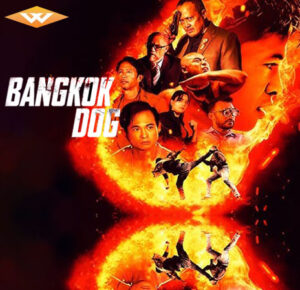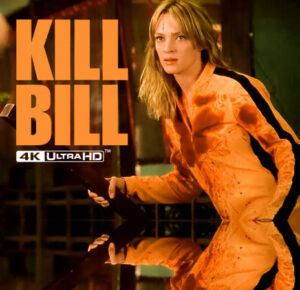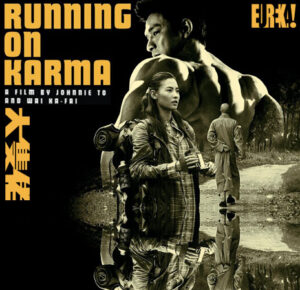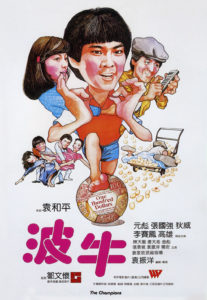Director: Jackie Chan
Producer: Leonard Ho
Cast: Jackie Chan, Maggie Cheung, Rosamund Kwan Chi Lam, Carina Lau, Mars, David Lam, Bill Tung, Kenny Ho, Ricky Hui, Regina Kent, Lau Siu Ming, Ray Lui, Anthony Carpio, Alan Chan, Chan Dik Hak, Chan Wai Man
Running Time: 106 min.
By Ro
Not as good as the original, but still great! I missed Samo and Yuen, but this movie is chock full of brawls – almost non-stop action! Highlights include: A chase and fight scene with Jackie handcuffed to a clumsy corrupt cop while dodging ax-wielding ex-pirates, the hysterically funny scene with a whole slew of people hiding from each other in Maggie Cheung’s apartment, Jackie dressed up for a party in a high collar, cravat and cutaways, a stuntman falling from a 2nd floor balcony with only a 6″ vase to break his fall, the political activist leaping onto the neck of a bad guy and them doing a couple somersaults – still attached (I can’t really describe it – you have to see it!) and the incredible brawl at the end, where Jackie is almost made into pate! And I can’t forget to include the famous stunt with Jackie running down the side of a falling building! Don’t pull a Boggie Nights and spend the whole movie waiting for it – it’s at the very end!!!
For a movie that almost never stopped the action, it had a pretty involved plot, with corrupt cops, political activists and ex-pirates – all after Jackie! Yet it all blended together well and I didn’t miss a beat wondering what was going on. Most unbelievable scene – Bill Tung borrowing a blouse from Maggie Cheung! I’m pretty good at suspending disbelief for these movies, but even my imagination boggled at the idea that the solid Tung could fit into petite Maggie’s clothes!!!
I got the video from Advantage (it’s a Venom Video) and the quality’s OK (though I wished it was letterbox), and the dubbing’s OK as well. Definitely a must-see!
Ro’s Rating: 9/10
By Numskull
Five minutes after being cast out of Heaven, Lucifer said “Let there be sequels”. Actually, this movie is different enough from the first PROJECT A to have stood on its own. Samo and Yuen are absent, but that’s not why this movie isn’t so memorable. The lame-ass background plot with the pirates was pure cheese. The giggling female characters caused my walls to receive a rich coating of nice, chunky vomit, but what the hell, the paint was starting to peel anyway. The fighting wasn’t as plentiful or as painful-looking as before. The scene where Jackie and the Commisioner try to escape from the pirates while hand-cuffed to each other was amusing, but it didn’t have anything you wouldn’t expect it to have (unless you’re into whips and chains and that sort of shit, like my classmates in kindergarten were. I’ll never look at milk and cookies the same way again, lemme tell ya…every time I hear “time out” I scream in terror…).
One strong similarity to the first PROJECT A: choppy plot. If there’s one thing I can’t stand it’s a choppy plot. If there are two things I can’t stand they’re a choppy plot and the Spice Girls. If there are three things I can’t stand they’re a choppy plot, the Spice Girls, and that fucking Pepsi commercial with the Spice Girls in it. If there are four things I can’t stand… Sorry.
In spite of all this, the movie wasn’t really bad, but I did suffer from one immense stroke of disappointment: the fact that there was NO outburst of violence in the governor’s house during his daughter’s birthday party. We all know that Jackie has no qualms about spending ungodly amounts of money, so why the hell did he pass up the opportunity to wreak nine kinds of chaos upon all of those rich Capitalist fuckers with their art collections and neckalces that get worn once a year and expensive teacups that they drink from with their pinkies sticking up? SHIT!!! That lingering shot on the chandelier was such a fucking tease! Why, Jackie, why?
Numskull’s Rating: 6/10
By Dan-O
Why oh why did they have to go and use the pirates from part one? Couldn’t someone have come up with a more interesting group of villains than a bunch of wussy wanna-be buccaneers that lost their asses IN THE LAST DAMN MOVIE! How about crossdressing lesbian cup-wearing nuns? That at least would be kinda scary.
That aside, this is a great Jackie Chan movie. I say it is a great Jackie Chan movie because this kind of movie would ONLY work for JC. But that’s why were all JC fan-girls and boys, yes?. As usual, stunts and fights are superb, blah blah blah, with silent film homages galore, and as a bonus we get to see Jackie destroy his digestive tract with those pepper things that I wouldn’t go near at gunpoint. Was it as good as the original? Nope. Sorry. But that’s not to demean or devalue the film in any way. Project A2 is good, solid entertainment. “Biodome” is not good, nor solid, nor entertainment. See the difference? Good. Now go to bed.
Dan-O’s Rating: 7.5/10
By Vic Nguyen
Jackie Chan does it again! Although not as good as Drunken Master 2 and Mr. Canton and Lady Rose, this film is incredible in its own right. Jackie reprises his role as Dragon Ma, Coast Guard officer recently promoted to one of Hong Kong’s many police precincts. The film follows him through all types of duties as the leader. It then all changes when he is framed for stealing a rare diamond necklace. Now it is up to him to clear his name and kick some ass in the process. This film has one of the best combinations of action and humor in any Jackie Chan film. It also has some of the greatest stunts ever shot on film, including a homage to Jackie’s favorite star Buster Keaton. The only bad part of this movie is the obvious absence of Sammo Hung and Yuen Biao. Other than that, this film is one of Jackies greatest and should not be missed by anyone, Jackie Chan fan or not.
Vic Nguyen’s Rating: 10/10
























Be the 1st to Comment